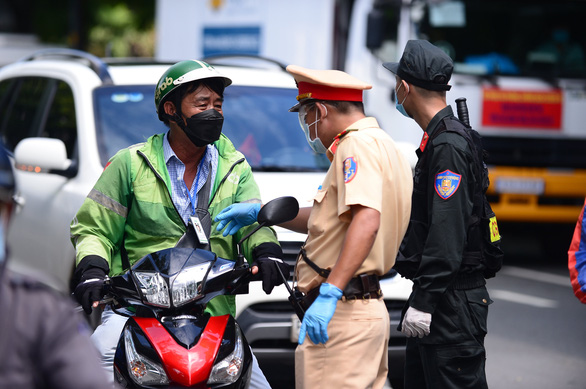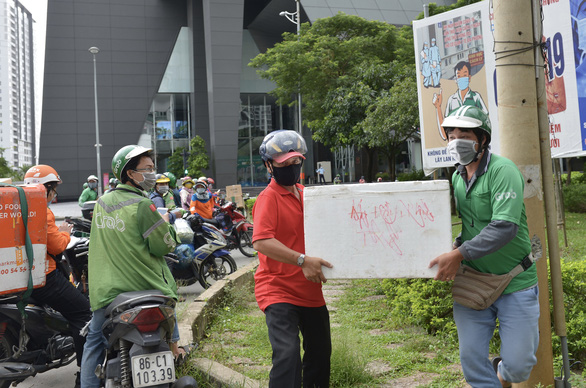Many residents in Ho Chi Minh City have reported a price upswing, coupled with late conveyance and constant cancelations, on delivery apps like Grab, Ahamove, and Now, which could be attributed to a shortage of delivery workers during the extended social distancing period that the city is going through.
Quynh Anh, a resident of District 12 in Ho Chi Minh City, said she has relied on an app-based delivery service to source groceries from the nearby Co.op To Ky Supermarket for quite some time.
After the city has been put under an extended social distancing drive that forced everyone to stay home since late May, the service was shut down, leading her to find groceries at a shop farther away in Go Vap District.
However, she no longer has that option as a recent update in Ho Chi Minh City's epidemic prevention guidelines stated that delivery workers are not allowed to travel cross-district, except for some necessary cases.
In a desperate attempt, she contacted another supermarket in her district, only to find out that it has stopped receiving new delivery orders due to high demand.
“Multi-service apps no longer work as there are no drivers who pick up orders,” Anh said.
“In the end, I have no choice but to go out and queue at a supermarket."
Anh’s situation is echoed by many other customers as they struggled to place grocery delivery orders on Thursday.
Nguyen My Chi, a dweller in Thu Duc City, was charged VND70,000 (US$3) by Ahamove for a delivery trip from her house to a relative’s, an almost three-fold rise from the normal fare.
“The fee is high, but there is hardly any driver to take my order,” she complained.
Such issues are attributed to the new restrictions that the city imposed upon the local roster of delivery workers.
Delivery workers on tenterhooks
According to digital delivery solutions, the Ho Chi Minh City administration has recently ordered their drivers to wear name cards and arm bands to prove their work status.
Besides, they must restrict their movement within an area of their choice, while the companies are told to cut around 10 percent of their delivery workforce.
“I only dare to drive around my home district now, which means I can only pick up a few orders per day,” said The, a delivery person in Thu Duc City.
These restrictions, while crucial, have greatly hindered delivery workers from fulfilling customers’ orders.
Hiep, a driver for Ahamove, said the company only provided them with a QR code for identification, while they had to source out name cards and arm bands by themselves, at a time when most printing shops have closed following the city’s order.
|
|
| Delivery workers are stopped at a checkpoint in Nha Be District, Ho Chi Minh City. Photo: Tu Trung / Tuoi Tre |
“Without paperwork and identification, we are on tenterhooks every time we fulfill an order,” said Tam, another delivery driver.
“In the past, cross-district orders made up 80-90 percent of our commissions.
“The area limit and night-time travel restrictions have greatly affected our income.”
In theory, delivery workers can travel cross-district when they convey essential items to lockdown areas and quarantine centers.
In reality, many have reported being pulled over and penalized by officials at COVID-19 checkpoints for leaving their respective district, delivering non-essential items, or not wearing identification accessories for delivery workers, even when their duties are legally justified.
In order to fulfill an order, they now have to figure out ways to dodge checkpoints, going winding routes to reach the destination.
“As checkpoints make it harder to convey orders, not to mention risks of financial penalty and virus transmission, many have dropped out of the job,” said Minh, a delivery worker.
“The monitoring of epidemic safety guidelines among delivery workers are necessary, but an all-inclusive definition of essential items is also needed, as it is standing in the way of delivery operations,” said Nguyen Ngoc Dung, deputy chairman of the Vietnam E-Commerce Association (VECOM).
According to Dung, VECOM fully supports the city’s decision to tighten control on delivery workers, including the issuance of a special ID for all active workers, but limiting a person's travel area to their respective home district is unreasonable, as it disrupts the supply chain and impedes circulation of goods.
“We suggest that the city utilize a QR code-based system or an ID card system to manage delivery workers," he said.
As city authorities have introduced a 6:00 pm - 6:00 am travel restriction to combat the spread of COVID-19, Dung also proposed that delivery workers wear special reflective outfits to signify their essential working status as they work during the restrictive hours.
Inflated delivery fees
Seeing the delivery worker shortage, digital solutions like Grab, Gojek, and Ahamove are scrambling to complete QR code identification and delivery worker profile registration for their remaining drivers.
Approved drivers will receive a confirmation message from the Ministry of Industry and Trade, and will be allowed to operate in a specific area.
Discussing with Tuoi Tre (Youth) newspaper, the apps’ representative confirmed that they had to hike up the fares in order to incentivize their driver partners to stay with the job and refrain from canceling orders.
According to Phan Tuong Bach, chief operating officer at Ahamove, the current fee surge does not seem to be sufficient, as the app has not found enough drivers to fulfill customers’ demand.
“Many delivery workers want to stay at home as they will have to face risks of COVID-19 transmission and penalties at checkpoints,” he expounded.
“Residents of Ho Chi Minh City are placing around 100,000 delivery orders per day, but there are not enough drivers.”
Responding to the dearth of delivery workers, mobile application Grab has limited their delivery services within each district’s border, which is anticipated by the firm as a solution to cool down the fare raise.
Meanwhile, Grab’s competitor Gojek has promised not to raise delivery fees during social distancing, even when demand is rising up to six times and manpower is in short supply.
Like us on Facebook or follow us on Twitter to get the latest news about Vietnam!


















































